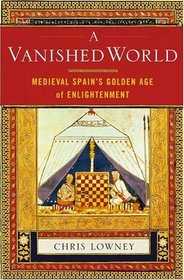I had high hopes for this book, but it was somewhat disappointing. Some chapters were fascinating, while others were boring. However, it was interesting to learn the true stories of El Cid and Roland.
Another interesting aspect of the book was the Arabic origin of words and places we often take for granted as coming from European languages. For example, Gibraltar come from "Jabal Tariq," which means Tariq's Mountain. Tarig was the Arab who commanded the Muslim forces which invaded Iberia in the year 711.
One of the great benefits the Muslims eventually provided to Europe, and later the world, was their use of Hindu-Arabic mathematics. The Hindus were great mathematicians and the Arabs learned from them. Especially valuable was their concept of Zero. I enjoyed it when the author stated:
"Hindu-Arabic numerals could be used in various operations, including in the field most high school graduates surely wish he (Al-Kwarizia) had kept to himself. Thank his 'Al-jabr wal Muggabala' (Completion and Balancing) for introducing us to the torture we still call 'al-jabr'(algebra)."
I hated Algebra and Calculus. And I still tell people I was so bad at mathematics that if I had 50 cents for every math test I failed, I'd have $67.34
One paragraph early in the book has tremendous importance to today's world and our future. I quote:
"Today's cutting edge science and technology may by 3400 C.E. seem no less buffoonish than some of Isidore's assertions appear. How will that glorious artifact of twentieth-century, the gas-powered automobile, strike Earth's citizens fourteen centuries hence as they tool around in whatever contraptions they've engineered to navigate a planet long since sucked dry of fossil fuels? Indeed, who even one century from now will consult an encyclopedia assembled in 2004? Who today can even find an encyclopedia composed in 1904?"
We're quickly using up fossil fuels in incredibly stupid ways, such as in gas-powered equipment to make totally useless lawns look neat. Plus, if and when the power goes out or some other problem occurs, where are the books we can consult to fix the problem?
Another interesting aspect of the book was the Arabic origin of words and places we often take for granted as coming from European languages. For example, Gibraltar come from "Jabal Tariq," which means Tariq's Mountain. Tarig was the Arab who commanded the Muslim forces which invaded Iberia in the year 711.
One of the great benefits the Muslims eventually provided to Europe, and later the world, was their use of Hindu-Arabic mathematics. The Hindus were great mathematicians and the Arabs learned from them. Especially valuable was their concept of Zero. I enjoyed it when the author stated:
"Hindu-Arabic numerals could be used in various operations, including in the field most high school graduates surely wish he (Al-Kwarizia) had kept to himself. Thank his 'Al-jabr wal Muggabala' (Completion and Balancing) for introducing us to the torture we still call 'al-jabr'(algebra)."
I hated Algebra and Calculus. And I still tell people I was so bad at mathematics that if I had 50 cents for every math test I failed, I'd have $67.34
One paragraph early in the book has tremendous importance to today's world and our future. I quote:
"Today's cutting edge science and technology may by 3400 C.E. seem no less buffoonish than some of Isidore's assertions appear. How will that glorious artifact of twentieth-century, the gas-powered automobile, strike Earth's citizens fourteen centuries hence as they tool around in whatever contraptions they've engineered to navigate a planet long since sucked dry of fossil fuels? Indeed, who even one century from now will consult an encyclopedia assembled in 2004? Who today can even find an encyclopedia composed in 1904?"
We're quickly using up fossil fuels in incredibly stupid ways, such as in gas-powered equipment to make totally useless lawns look neat. Plus, if and when the power goes out or some other problem occurs, where are the books we can consult to fix the problem?




